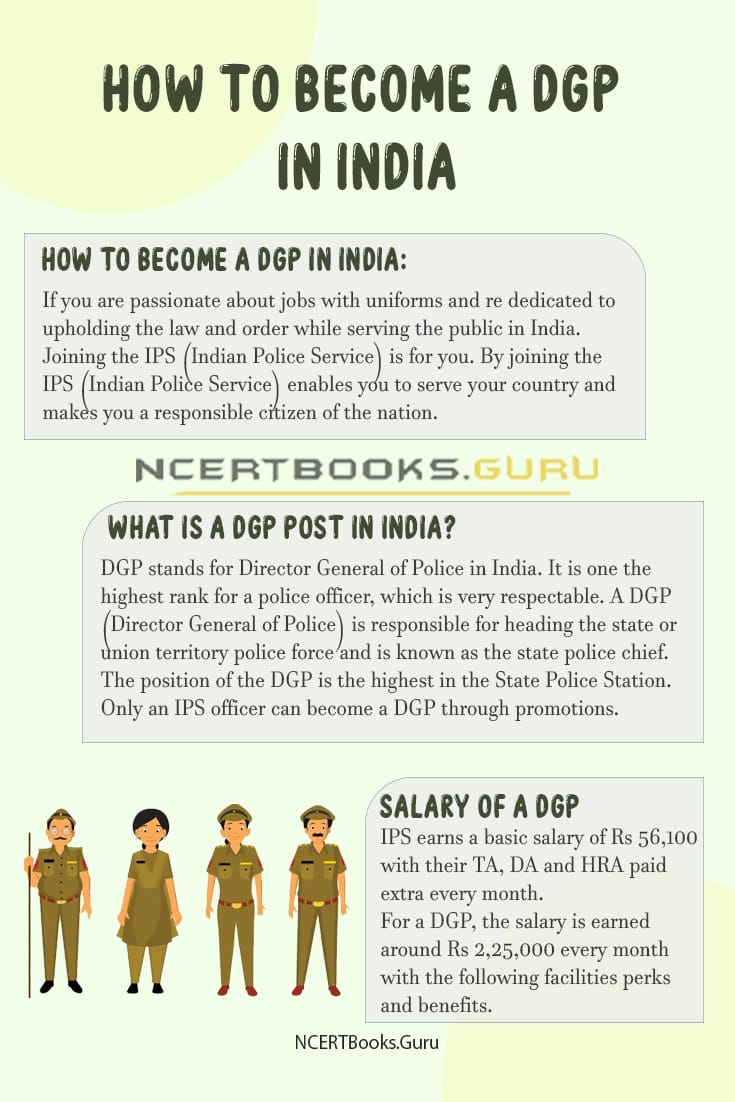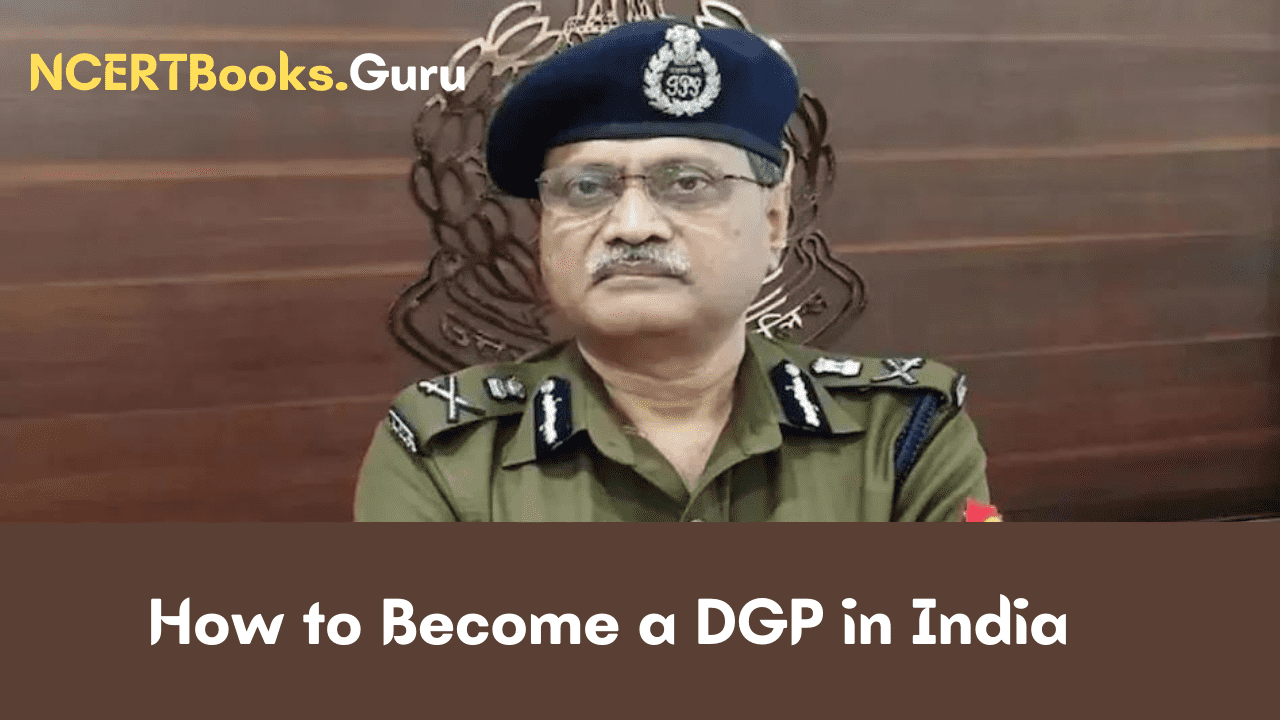How to Become a DGP in India: If you are passionate about jobs with uniforms and are dedicated to upholding the law and order while serving the public in India. Joining the IPS (Indian Police Service) is for you. By joining the IPS (Indian Police Service) enables you to serve your country and makes you a responsible citizen of the nation. One of the highest positions achieved in the IPS (Indian Police Service) is of a DGP (Director General of Police)
- What is a DGP Post In India?
- Courses Available for Becoming A DGP In India
- Eligibility Criteria for Becoming A DGP In India
- How to Become an IPS In India?
- How to Prepare for the DGP Examination?
- Skill Set Required for Becoming a DGP
- IPS Chest Girth Requirement
- IPS Height Requirement
- Roles and Responsibilities of a DGP?
- Salary of a DGP
- Conclusion on How to Become a DGP in India
What is a DGP Post In India?
DGP stands for Director General of Police in India. It is one the highest rank for a police officer, which is very respectable. A DGP (Director General of Police) is responsible for heading the state or union territory police force and is known as the state police chief. The position of the DGP is the highest in the State Police Station. Only an IPS officer can become a DGP through promotions.
Refer to Course Details to know more about related courses and find details like Admission Process, Eligibility Criteria, etc.
The director-general of police in India is appointed from the Indian police service by the cabinet. They hold 3-star ranks of a DGP, and we will find an over-crossed baton and a sword as its national emblem upon taking a closer look at the rank insignia.
You can identify DGP’s from a distance as they wear gorget patches on their collar. That has a pattern of oak leaf stitched on it, with a blue-coloured background.
Courses Available for Becoming A DGP In India
To become a DGP, candidates must have any one of the educational qualifications enlisted below.
- Candidates having a bachelor or master degree from a state, central, or from a deemed university.
- Candidate having a master or a bachelor degree from any of the private universities.
- Candidates having a bachelor or master degree from an open university.
- Candidates having a bachelor or master degree from a distance or correspondence education.
- Candidates who have cleared the final examination of their MBBS degree but have not yet completed their internship.
- Candidates who have cleared their final examination of ICWAI ( Institute of Cost & Works Accountants of India), ICAI (Institute of Chartered Accountants of India), and ICSI (Institute of Company Secretaries of India)
- Candidates having a degree from a foreign university which the Indian university association recognizes.
After acquiring their academic qualifications, candidates must qualify for the civil services exam conducted by UPSC (Union Public Service Commission). This examination can be given upon completion of the Bachelor degree.
Eligibility Criteria for Becoming A DGP In India
A candidate aspiring to be a DGP should be at least 21 years to 32 years of age. This age limit is for the general category candidates. In contrast, for the Schedule caste (SC) and Schedule Tribe (ST), the age limit is 37 years, whereas, for the OBC (Other Backward Caste) candidates, the age limit is 35 years.
A relaxation of the upper age limit is set for some backwards candidates regarding being physically handicapped. All candidates must have passed their bachelor’s degree and qualified for the UPSC examination conducted by the Union Public Service Commission and then become an IPS officer first. The post of DGP can be reached only through promotion.
How to Become an IPS In India?
To become a DGP, the IPS exam needs to be cleared first. There are two modes for IPS recruitment.
- Promotion of the state police officers
- Clearing the civil services exam organised by the UPSC.
The UPSC Civil Services Exam consists of three stages. The exam window extends for around 10-12 months, usually from June to the following year, June, until the results are announced.
The exam is in the following format,
- Preliminary exam (objective)
- Main exam (written)
- Interview (personality test)
The number of IPS officers selected by UPSC every year is 150 in number.
Also, See:
- How to become SP Superintendent of Police in India
- How to become DSP in India
- How to become a DCP Deputy Commissioner of Police in India
How to Prepare for the DGP Examination?
Firstly, you have to pay attention to the syllabus in which much of knowledge has to come from General Knowledge. Start by learning current affairs as it is helpful in the examination. Studying the old question paper for the exam helps a lot.
If you want, you can study in this way, make a goal for yourself and prepare for your exam accordingly.
Prominent Institutions for IPS Training
All officers of the Indian Police service undergo probationary training at the following institutions,
- Lal Bahadur Shastri National Academy of Administration, Mussoorie
- Sardar Vallabhbhai Patel National Police Academy, Hyderabad.
After completing the successful probationary training period, officers get confirmed into the service. There is also a provision for mandatory mid-career training for IPS officers spread across the entire service span.
The Police Division in the Ministry of Home Affairs (MHA) is responsible for cadre management of the IPS officers.
Skill Set Required for Becoming a DGP
The candidates must have eye vision according to the Indian Police Service Standards:
- Distant Vision: For the distant vision, the vision should be 6/6 or 6/9 for the better eye and 6/12 or 6/9 for the worse eye
- Near Vision: The corrected vision should be J1** for the better eye for the near vision. The corrected vision should be J2** for the worse eye. Corrections permitted in eyesight would include corrections like Spectacles, CL and Refractive Surgery like ICL, IOL and Lasik. However, if a refractive surgery was performed on the candidate, the case gets referred to a Special Board of Ophthalmologists.
- Refractive errors permitted: There is no such limit on refractive errors being permitted. Although candidates with a Myopia of more than 6.00 D, including cylindrical and spherical error, should get referred to a special Myopia Board.
- Also, the candidate needs to have high-grade colour vision and binocular vision to be considered medically fit for IPS.
- A candidate is declared unfit for IPS if they have a squint.
IPS Chest Girth Requirement
- Female candidates should have a chest girth of 79 centimetres
- Male candidates should have a chest girth of 84 centimetres
- Candidates should be able to expand their chest size by 5 centimetres.
IPS Height Requirement
- Height Requirement for Female Candidates: Minimum 150 cm
- Height Required for Male Candidates: Minimum 165 cm
Roles and Responsibilities of a DGP?
- Being the highest-ranking post in police, the roles and responsibilities of the DGP include the following.
- The DGP is the highest rank in the hierarchy of the Indian state police and doesn’t report to anyone, not even the police commissioner, since it is not a post but a rank.
- The director-general of police acts as an advisory to the state government relating to the administration of the police force.
- The Director-General of police keeps an eye on the disciplinary authority. The DGP has the authority of checking and supervising the functioning of their department.
- The DGP makes rules according to the police act and might issue orders after the government’s approval.
- A DGP discharges duties to the specific police department. The DGP is responsible for training and disciplining the police force for ensuring law and order.
- The DGP might place the reserved police force during an emergency pertaining to law-and-order issues.
- The DGP is responsible for giving instructions and direct operations during industrial disputes, strikes or riots. Operations of such type remain under the control and direction of the Director-General of Police.
- The DGP is responsible for informing the chief minister and other related officers on official tours and visits.
Salary of a DGP
The government offers a handsome amount of salary to a DGP, which is listed below:
The position of a DGP is of the highest rank, and to become a DGP, one has to remain in the position of an IPS officer for a long tenure.
Initially, the IPS earns a basic salary of Rs 56,100, with their TA, DA and HRA paid extra every month.
For a DGP, the salary is earned around Rs 2,25,000 every month with the following facilities perks and benefits, which include,
- Private accommodation is posted as a DGP, which means they don’t have to pay any rent.
- Domestic helper
- Official vehicle for the DGP with a driver
- Security guard
- Other facilities such as and free medical treatment, free electricity and free telephone,
- A DGP gets various benefits such as retirement benefits, lifetime pension, study abroad etc.
Their job is highly respected and with job security as well.

Conclusion on How to Become a DGP in India
To become an IPS officer, one has to qualify for the UPSC examination, one of the country’s toughest exams. Initially, the officer gets the position of ASP (Assistant Superintendent of Police), SP (Superintendent of Police), DIG (Deputy Inspector General of Police), Addl. DG (Additional Director General) and DG (Director General)
To become a DGP, you must work diligently to become an IPS and serve the country by being a good police officer for a long tenure. This will qualify you to become a director general of police in India. The DGP has greater responsibility in protecting and serving communities, assisting people in time and even ending crime. A career in the Indian police is an opportunity to make an impact in society and the nation by taking up a citizen’s responsibility in serving the nation proudly.
